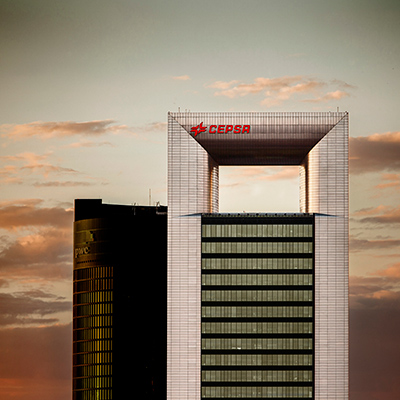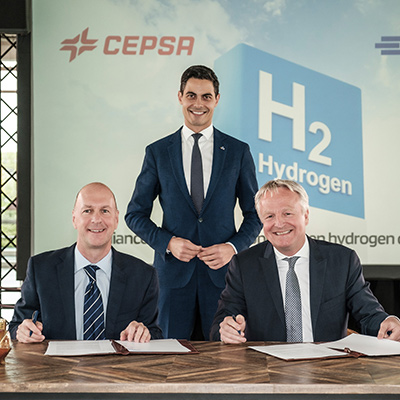- Both companies will drive the development and production of sustainable aviation fuel (SAF) from circular raw materials
- Agreement follows initiative in Seville where Wizz Air flights were among more than 200 to depart from the airport using SAF from Cepsa
- This new partnership represents Cepsa’s steadfast commitment to SAF and ambition to lead in this sustainable fuel with an annual production capacity of 800,000 tons by 2030
- Sustainable fuels reduce CO2 emissions by up to 90% compared to traditional fuels
- Wizz Air currently operates in 14 Spanish airports, including Alicante, Barcelona, Bilbao, Madrid, Malaga, Palma de Mallorca, Seville, Tenerife and Valencia
This sustainable fuel will be produced from organic waste, such as used cooking oils or agricultural waste, among others. These biofuels promote the circular economy by being produced from waste that would otherwise end up in landfills and will make it possible to reduce aircraft emissions by up to 90% compared to conventional kerosene.
The partnership follows an initiative at the Seville Airport in November, 2022, when Wizz Air was among 220 flights that departed from the airport over one week using SAF produced by Cepsa at its La Rábida Energy Park in Huelva. This was the first time that a SAF supply of these characteristics was carried out at an airport in southern Europe. It was also the first time in Spain that the entire value chain was certified traceable by the ISCC (International Sustainability Carbon Certification) system from the production of the sustainable fuel to the actual supply.
Tobi Pardo, Cepsa’s Director of Aviation, said: "At Cepsa we are committed to creating solutions that make air transport more sustainable and partnerships like the one with WizzAir to develop SAF are absolutely fundamental in our joint decarbonization journey with our clients.”
Ian Malin, Executive Vice President and Group Chief Financial Officer at Wizz Air, said: “We are excited to partner with Cepsa, a renowned energy company, to establish a SAF supply chain for Wizz Air in Spain. In addition to flying the world’s most sustainable fleet, we are making biofuel a key element to maintaining our leadership in sustainability and exceeding our commitment to reduce carbon intensity by 25% by 2030.”
The MoU is in line with the European Commission's Fit for 55 package, which includes a legislative initiative called 'RefuelEU Aviation’ that aims to boost the supply and demand of aviation biofuels in the European Union to 2% use by 2025, 5% by 2030 and 63% by 2050. This partnership supports several of the 2030 Agenda’s Sustainable Development Goals: SDG 7 (Affordable and clean energy), SDG 8 (Decent work and economic growth), SDG 12 (Responsible consumption and production) and SDG 13 (Climate action).
As one of the main producers and suppliers of aviation fuels in the Spanish market, this new agreement consolidates Cepsa’s aim to become a leader in the clean energy sector and to spearhead the decarbonization of air transport. As part of its strategic plan, Positive Motion, the company is developing an ecosystem focused on accelerating the decarbonisation of industrial customers and air and maritime transport, as well as the company itself, through the production of green molecules, mainly renewable hydrogen and biofuels. Cepsa aspires to be the leading biofuel producer in Spain and Portugal by 2030 with a production capacity of 2.5 million tons per year, with a particular focus on the sustainability of air traffic by having an annual production capacity of 800,000 tons of SAF.
The company has established an ambitious roadmap to cut its emissions, placing it among the benchmark companies in its sector. By 2030, it will reduce its Scope 1 and 2 CO2 emissions by 55% and the carbon intensity index of its products by 15-20% and aims to reach net zero emissions by 2050.
Wizz Air has established its SAF strategy, which includes securing offtake agreements with suppliers for the future to reduce carbon emissions per passenger/km by 25% by 2030 and reach net-zero by 2050. In 2022, the airline achieved its lowest ever annual carbon intensity, which amounted to 55.2 grams, 15% lower than in 2021. Wizz Air has been continuously adding new Airbus A321neo aircraft to its fleet and replacing older aircraft, with the share of new “neo” technology aircraft already surpassing 50% of Wizz Air’s fleet. The new Airbus A321neo aircraft incorporates the latest technology, offering significant environmental benefits and can currently fly with up to 50% SAF blend. In addition to the ambitious fleet renewal programme, Wizz Air is constantly working on fuel efficiency initiatives and improving the related data analytics.
Wizz Air currently operates flights to 14 Spanish cities: Alicante, Barcelona, Bilbao, Castellón, Fuerteventura, Ibiza, Madrid, Málaga, Palma de Mallorca, Santander, Seville, Tenerife, Valencia and Zaragoza.




